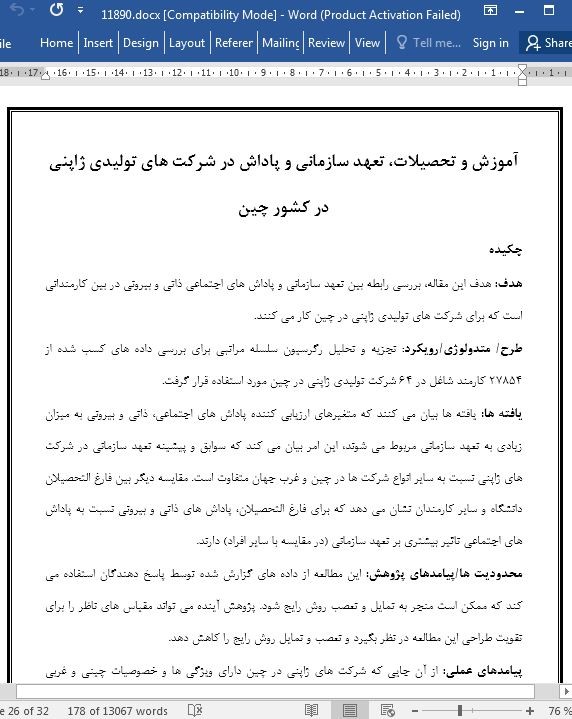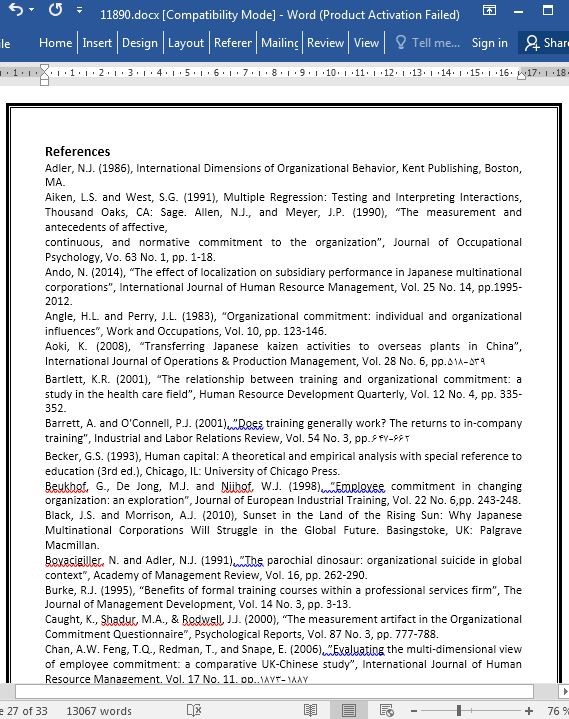
آموزش و تحصیلات، تعهد سازمانی و پاداش در شرکت های تولیدی ژاپنی در کشور چین
چکیده
هدف: هدف این مقاله، بررسی رابطه بین تعهد سازمانی و پاداش های اجتماعی ذاتی و بیرونی در بین کارمندانی است که برای شرکت های تولیدی ژاپنی در چین کار می کنند.
طرح/ متدولوژی/رویکرد: تجزیه و تحلیل رگرسیون سلسله مراتبی برای بررسی داده های کسب شده از 27854 کارمند شاغل در 64 شرکت تولیدی ژاپنی در چین مورد استفاده قرار گرفت.
یافته ها: یافته ها بیان می کنند که متغیرهای ارزیابی کننده پاداش های اجتماعی، ذاتی و بیرونی به میزان زیادی به تعهد سازمانی مربوط می شوند، این امر بیان می کند که سوابق و پیشینه تعهد سازمانی در شرکت های ژاپنی نسبت به سایر انواع شرکت ها در چین و غرب جهان متفاوت است. مقایسه دیگر بین فارغ التحصیلان دانشگاه و سایر کارمندان نشان می دهد که برای فارغ التحصیلان، پاداش های ذاتی و بیرونی نسبت به پاداش های اجتماعی تاثیر بیشتری بر تعهد سازمانی (در مقایسه با سایر افراد) دارند.
محدودیت ها/پیامدهای پژوهش: این مطالعه از داده های گزارش شده توسط پاسخ دهندگان استفاده می کند که ممکن است منجر به تمایل و تعصب روش رایج شود. پژوهش آینده می تواند مقیاس های ناظر را برای تقویت طراحی این مطالعه در نظر بگیرد و تعصب و تمایل روش رایج را کاهش دهد.
پیامدهای عملی: از آن جایی که شرکت های ژاپنی در چین دارای ویژگی ها و خصوصیات چینی و غربی هستند، آن ها اغلب از اقدامات مدیریت منابع انسانی متعادل HRM استفاده می کنند. برای افزایش تعهد سازمانی OC کارمندان، به ویژه افرادی با آموزش و تحصیلات رسمی کمتر، تمرکز بر برخی از پاداش های ویژه هم چنین انواع مختلفی از سایر پاداش ها، بسیار موثر است. با این حال، HRM متعادل ممکن است اثربخشی یکسانی برای افزایش OC فارغ التحصیلان دانشگاه نداشته باشد، افرادی که کسب پاداش های بیرونی و ذاتی بیشتر و پاداش های اجتماعی کمتر را ترجیح می دهند. از آن جایی که گفته می شود شرکت های ژاپنی، محیط و محل کار جذابی به ویژه برای فارغ التحصیلان دانشگاهی نیستند، نتایج این مطالعه می تواند به متخصصین HR کمک نماید که استراتژی های HRM خود را اصلاح کرده و کارگرانی را به خدمت بگیرند که می توانند در بازه زمانی بلندمدت برای شعب چینی آن ها موثر بوده و نقش داشته باشند.
منشا/ارزش: این پژوهش بررسی می کند که کارمندان شرکت های ژاپنی در چین چگونه می توانند تعهد سازمانی بالاتری داشته باشند. این مطالعه بر تفاوت های بین فارغ التحصیلان دانشگاه تمرکز کرده و از حجم زیادی از داده های نظری آن ها استفاده می کند.
نتیجه گیری
هدف این مطالعه، بررسی رابطه بین پاداش های بیرونی و درونی و اجتماعی و تعهد سازمانی OC27854 کارمند شاغل در 64 شرکت تولیدی ژاپنی در چین بود. تحلیل رگرسیون سلسله مراتبی نشان داد که متغیرهای مورد نظر برای ارزیابی پاداش های درونی و بیرونی و اجتماعی به شدت با OC در ارتباط هستند. این یافته ها بیان می کنند که سوابق تعهد سازمانی در شرکت های ژاپنی نسبت به سایر انواع شرکت ها در چین متفاوت است، جایی که پاداش های بیرونی و اجتماعی هم بستگی بیشتری با OC سبت به پاداش های درونی دارند. ان ها هم چنین از شرکت های موجود در غرب، متفاوت هستند، جایی که پاداش های درونی هم بستگی بیشتری با OC نسبت به پاداش های بیرونی و اجتماعی دارند. به طور کلی،HRM متعادل اثربخشی بیشتری برای شرکت های ژاپنی با ترکیبی از ویژگی های چینی و غربی دارد. مدیران نباید تنها بر یک نوع پاداش خاص تمرکز نمایند بلکه باید انواع مختلفی از پاداش ها را برای افزایش OC کارمندان به ویژه برای کارمندانی با تحصیلات رسمی کمتر ارائه دهند.
Abstract
Purpose – The purpose of this paper is to investigate the relationship between organizational commitment and extrinsic, intrinsic, and social rewards, among employees who work for Japanese manufacturing companies in China.
Design/methodology/approach –Hierarchical regression ana Design/methodology/approach lysis was utilized to examine survey data obtained from 27,854 employees, who work for 64 Japanese manufacturing companies in China.
Findings – The findings demonstrate that the variables Findings measuring extrinsic, social, and intrinsic rewards were strongly related to organizational commitment, suggesting that the antecedents of organizational commitment in Japanese companies are different from those in other kinds of corporations in China and the West. A further comparison between university graduates and other employees showed that for graduates, extrinsic and intrinsic rewards had a stronger influence on organizational commitment than social rewards, compared to non-graduates.
Research limitations/implications - This study used self Research limitations/implications -report data from individual respondents, which may have resulted in common method bias. Future research might consider including supervisor-rated scales to strengthen the study design and reduce common method bias.
Practical implications - As Japanese companies in China Practical implications have both Western and Chinese characteristics, they often utilize balanced human resources management (HRM) practices. To enhance their employees’ organizational commitment (OC), especially those with less formal education, it is most effective to focus not only on some particular rewards but also on more varieties of rewards. However, balanced HRM may not be equally effective for enhancing the OC of university graduates, who prefer to obtain more extrinsic and intrinsic rewards and fewer social rewards. As Japanese companies are sometimes said to be less attractive workplaces, especially for university graduates, the results of this study could help HR professionals revise their HRM strategies and employ workers who can contribute to their Chinese branches on a long-term basis.
Originality/value – This research investigates how empl Originality/value oyees of Japanese companies in China could have higher organizational commitment, by focusing on the difference between university graduates and non-graduates and utilizing a large volume of their opinion data.
Conclusion
The purpose of this study was to investigate the relationship among extrinsic rewards, intrinsic rewards, social rewards, and the organizational commitment (OC) of 27,854 employees who work for 64 Japanese manufacturing companies in China. Hierarchical regression analysis revealed that variables included to measure extrinsic, social, and intrinsic rewards were strongly related to OC. These findings suggest that the antecedents of organizational commitment in Japanese companies are different from those in other kinds of corporations in China, where extrinsic and social rewards are more correlated with OC than intrinsic rewards. They also differ from companies in the West, where intrinsic rewards are more correlated with OC than extrinsic and social rewards. Overall, balanced HRM will work best given Japanese companies’ combination of Western and Chinese characteristics. Managers should not simply focus on one particular type of reward but offer a variety of rewards to enhance employees’ OC, especially for employees with less formal education.
چکیده
مقدمه
مروری بر ادبیات
شرکت های ژاپنی در چین
پاداش های سازمانی در چین
پاداش های بیرونی
رضایت از مزایا و منافع
خستگی و فرسودگی
پاداش های اجتماعی
حمایت و پشتیبانی سرپرست
حمایت و پشتیبانی همکار
پاداش های درونی
استقلال و خودمختاری
تهیه و ارائه آموزش
وضوح و شفافیت نقش
اهمیت تطبیقی پاداش ها
سطح آموزش و تحصیلات و اهمیت تطبیقی پاداش ها
متدولوژی پژوهش
شرکت کنندگان
معیارها
تحلیل و یافته ها
بحث و نتایج
پیامدهایی برای نظریه و عمل
محدودیت های مطالعه و پیشنهاداتی برای پژوهش آینده
نتیجه گیری
منابع
Abstract
Introduction
Literature Literature
Japanese companies in Chin
Organizational rewards in China
Extrinsic rewards
Benefit satisfaction
Fatigue
Social rewards
Supervisor support
Co-workersupport
Intrinsic rewards
Autonomy
Training provision
Role clarity
Comparative importance of rewards
The level of education and comparative importance of rewards
Research Methodology
Participants
Measures
Analysis and findings
Results and Discussion
Implications for theory and practice
Conclusion
Note
References
- اصل مقاله انگلیسی با فرمت ورد (word) با قابلیت ویرایش
- ترجمه فارسی مقاله با فرمت ورد (word) با قابلیت ویرایش، بدون آرم سایت ای ترجمه
- ترجمه فارسی مقاله با فرمت pdf، بدون آرم سایت ای ترجمه


